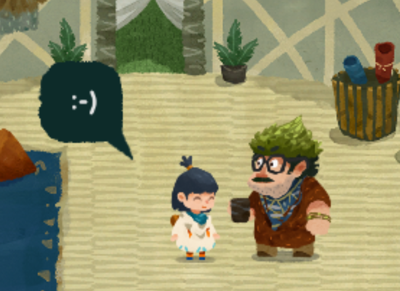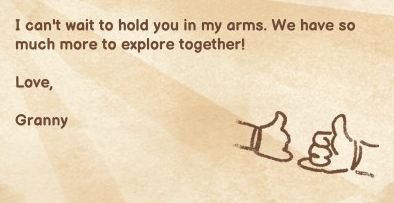I had a lot of fun playing the indie game Carto (2020), an innovative and enjoyable puzzle game where you put map pieces together, changing in-game reality itself to overcome obstacles and help reunite our heroine Carto and her grandmother. I don’t think I could add much to what has already been said about its gameplay and narrative, and there’s a good selection of reviews linked from the game’s Metacritic page.
What I haven’t seen discussed as much is that the titular protagonist Carto appears to be a nonspeaking person, or one who only occasionally speaks. Though reviews like this one or this one alluded to her silence, they generally put it down to her being quiet or shy. Carto may be quiet, but shy? Nah. There’s no reason to discount neurodivergence as an explanation and here’s my case for it.
SPOILER WARNING: The rest of this post contains spoilers about the world and story of the game Carto.
A smile is worth a thousand words :-)
From the first I found it slightly odd that Carto’s “dialogue” was represented by emojis, most commonly the smile emoji :-) accompanied by her sprite representation smiling. Every other character’s lines were represented by actual words, after all. She also did not seem to be deaf, since she understood when other characters addressed her in spoken language.

I was excited at the thought that Carto might be hearing but nonspeaking, since my son is mostly nonspeaking and I’m always thrilled at good autistic representation in media. Still, I thought the emojis could be an abstraction of Carto’s lines rather than a literal depiction so I didn’t get my hopes up too much. There was so much else to enjoy about the game, after all.
Undoubted confirmation came toward the end of the game, like a gift. When Carto finally meets up with her grandmother, her best friend Shianan jokes about not hearing much about the grandmother because Carto is so quiet.
It looks like Shianan could have heard a lot about Grandma if she’d had time to learn sign language, though, because Grandma’s last letter prior to the meeting has a sketch of her and Carto signing to each other.

Carto also speaks a little toward the end, mostly names–“Grandma!” “Carto and Shianan!” and so on, showing that her earlier emoji-talk was not an abstraction but actual representations of facial expressions without spoken words.
So there you have it, Carto is a hearing and nonspeaking or minimally speaking character who speaks primarily in sign language. She seems to have little trouble with verbal comprehension or writing, the latter seen in a letter she sends Shianan in the epilogue.
It was such a rare case of a nonspeaking character, the main character at that, shown in a way that’s not left open for interpretation or headcanons but made explicitly clear as canon. It’s hard to express the depth of my appreciation for this, except maybe by writing a giant review and shoutout post on that one subject I guess.
No big deal, because it isn’t
Something else I found refreshing is that Carto’s being nonspeaking is no big deal at all to the other characters. Shianan mentions it once, as discussed above, in a gently teasing/apologetic way after she and Carto have become good friends. Otherwise, the characters Carto comes across don’t bring it up, interacting without making a fuss when Carto communicates nonverbally, such as by signing or showing “sand” to them when she wants directions to the desert.
One moment of respectful but casual accommodation that comes to mind is when Carto was at the volcano hotel1 rebooting their water heating system. The machinery is accessible by climbing a rope down a pit, and one of the hotel’s proprietors remains at the top while Carto climbs down. When Carto reaches the boiler room at the bottom, the proprietor calls out to her to pull on the rope when she wants to climb back up.
This left an impression because the two characters are never out of shouting distance from each other, and the proprietor guides Carto through the ultimately disastrous reboot sequence by vocal instruction. The proprietor, in other words, noticed Carto doesn’t speak and made no comment about it, but opted to give her the instruction to pull on the rope rather than shout, accommodating the lack of vocal communication.
In a better world this is how all accommodation would happen, respectfully and with minimal comment. In an even better world hotel proprietors would also not send guests into dangerous locations to do their repair work. But we can’t have everything now, can we?
Maybe one reason the characters find Carto’s neurodivergence entirely unremarkable is that the world of the game is itself diverse, with many different ways of life coexisting. Carto’s own clan fly all around the world on blimps. We start her in-game adventures on an island where no one comes back home after leaving as a teenager. Later we move on to a forest where people grow huge beards, have animal companions, and one chosen person guards a giant growing tree for decades, away from human settlements.
Against this backdrop a girl who doesn’t speak is positively ordinary, and whether the reasons are neurological, cultural, or otherwise it doesn’t seem to be considered anyone else’s business. Is she physically or neurologically unable to speak? Does she not speak the local language? Did she take a vow of silence? Who knows, and what does it matter?
Cultural diversity leading to neurodivergence acceptance makes sense to me because neurotype normativity is just one of the many pressures for conformity that form the basis of bigotry in our world. This kind of coexistence between vastly different peoples is a fascinating aspect of Carto’s world.
I guess there should be a conclusion
Carto is a great little game that puzzle game lovers are likely to enjoy, one with a straightforward and entertaining story. It may also enhance your enjoyment that the hero of the game is a nonspeaking and, to my mind, autistic girl who enjoys full respect from the people around her, who is at no point seen as an aberration or tragedy.
Needless to say, I highly recommend the game. It’s fun and a little different, like Carto herself.
-
Is anyone going to talk about how the volcano stage contains homage to Legend of Kyrandia 2: The Hand of Fate, much like the icebergs stage does for Tetris? ↩︎